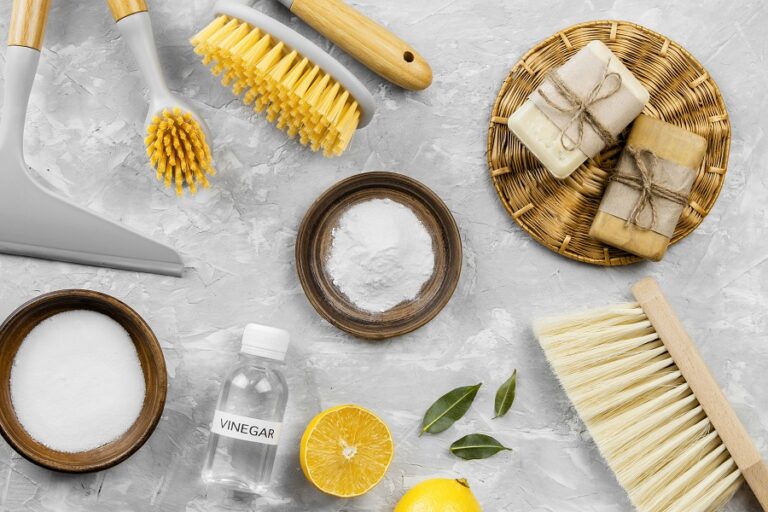Walking down the cleaning aisle can feel overwhelming and expensive. You’re hit with a wall of chemical fragrances and a dozen different products, each promising to tackle one specific job. What if you could replace nearly all of them with a handful of simple, safe, and incredibly cheap ingredients you probably already have at home? Making your own DIY cleaning products isn’t just a frugal hack; it’s a healthier choice for your home and the environment. You control what goes in them, eliminating harsh chemicals and synthetic scents. Plus, you’ll save a fortune. Here are 5 proven recipes that really work.
Your New Cleaning Pantry: The 4 Essential Ingredients
Before you start, you likely have this powerful cleaning squad in your kitchen already:
- White Distilled Vinegar: A natural disinfectant and deodorizer that cuts through grease and dissolves mineral buildup.
- Baking Soda: A mild abrasive that scours surfaces and neutralizes odors.
- Castile Soap: A plant-based, biodegradable soap that cuts grease and lifts dirt. (Dr. Bronner’s is a popular brand).
- Citric Acid or Lemons: Excellent for dissolving hard water stains and soap scum. Also adds a fresh scent.
1. The All-Purpose Cleaner (The Workhorse)
Best for: Countertops, appliances, cabinet fronts, sealed stone, and most hard surfaces.
Recipe:
- 1 ¼ cups water
- 1 cup white vinegar
- 15-20 drops of essential oil (optional: tea tree, lavender, or lemon for scent and added antibacterial properties)
Instructions: Combine all ingredients in a spray bottle. Shake well before use. Note: Do not use on granite or marble, as the acid in vinegar can etch the surface.
2. The Scrubbing Paste (For Tough Jobs)
Best for: Sinks, tubs, oven tops, stuck-on grime, and baked-on messes.
Recipe:
- ½ cup baking soda
- 2-3 tbsp liquid Castile soap
- 1-2 tbsp water
- 5 drops of essential oil (optional)
Instructions: Mix the baking soda and Castile soap in a small jar. Add water slowly until you achieve a spreadable paste consistency. Apply with a cloth or sponge, scrub, and rinse.
3. The Glass & Mirror Cleaner (Streak-Free Shine)
Best for: Windows, mirrors, and glass surfaces.
Recipe:
- 2 cups water
- ½ cup white vinegar or rubbing alcohol (alcohol helps it dry faster)
- 1-2 drops of natural dish soap or Castile soap
Instructions: Combine all ingredients in a spray bottle. Shake gently to mix. Spray on and wipe clean with a microfiber cloth for a streak-free finish.
4. The Toilet Bowl Cleaner (Fizzing & Fresh)
Best for: Cleaning and deodorizing toilet bowls.
Recipe:
- 1 cup baking soda
- ¼ cup citric acid (or ½ cup white vinegar, added separately)
- 10 drops tea tree essential oil (a natural disinfectant)
Instructions (Dry Method): In a jar, mix baking soda and citric acid. Add essential oil and stir. Sprinkle liberally into the toilet bowl. It will fizz. Let it sit for 15-20 minutes, scrub, and flush.
Instructions (Vinegar Method): Pour 1 cup of baking soda into the bowl, followed by ½ cup of vinegar. Let it fizz for 10 minutes, scrub, and flush.
5. The Disinfecting Wipes (DIY “Clorox” Wipes)
Best for: Quick disinfecting of high-touch areas like doorknobs, light switches, and faucets.
Recipe:
- 2 cups hot water
- 2 tbsp white vinegar
- 1 tbsp Castile soap
- 20 drops tea tree or lavender essential oil
- 1 roll of strong paper towels (or reusable cloths)
Instructions: Mix liquids in a large, airtight container. Cut the paper towel roll in half to fit and place one half in the liquid. Let it soak, then pull the center cardboard out to start the wipes from the middle. For a reusable option, soak small cloths in the solution and store in a jar.
Frequently Asked Questions (FAQ)
Do DIY cleaners actually disinfect?
While vinegar is a natural disinfectant, it is not registered with the EPA as a disinfectant like commercial products. For a non-toxic disinfecting boost, tea tree oil or hydrogen peroxide are effective alternatives. For critical disinfection (e.g., during illness), a commercial EPA-registered disinfectant may be necessary.
Why shouldn’t I use vinegar on granite or marble?
Vinegar is acidic. Natural stone surfaces are alkaline and porous. The acid can etch the shiny finish, leaving dull spots. For stone, use a cleaner specifically designed for it or a mild soap and water solution.
How long do these DIY cleaners last?
Most will last for several months. Since they don’t contain synthetic preservatives, it’s best to make them in smaller batches. The disinfecting wipes are best used within a month.
Can I use any essential oil?
Yes, for fragrance. For added cleaning power, tea tree, lemon, lavender, and eucalyptus essential oils have natural antibacterial and antiviral properties.
The Bottom Line: Cleaner Cleaning
Switching to DIY cleaning products is a simple, powerful step toward a healthier home and a healthier budget. You’ll be amazed at how effective these basic ingredients are and how good it feels to know exactly what you’re using to clean your family’s spaces.
